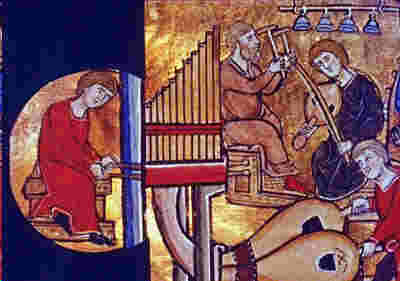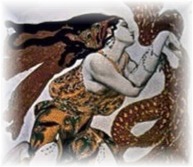
Gone but not forgotten
Here The Muse Of Music celebrates the bygone eras of so-called "popular" music
of the first half of the twentieth century, with emphasis on music of
the Two World Wars and the Big Band Era of the 30's and 40's. The Muse remembers
the people who created the music and those who listened to it.
About Sentimental Journey
The smooth and luscious voice you hear is that of Doris Day singing Sentimental
Journey. (She's backed up by Les Brown and His Band of Renown, who plays
a long, luxurious intro that, sadly, we've had to abbreviate). (If you don't
hear music,
click here).
Being from the South, it is fitting that Doris Day sing this number; so
many Southerners took sentimental journeys home by steam locomotive after
leaving the South during the 30s and 40s to find work in the big cities of
the North. (The modern-day equivalent is the Gladys Knight and the Pips
rendition of Midnight Train to Georgia.)
forgotten? No way!
The music is also fitting because, if you're willing, The Muse Of Music
will take you on a sentimental journey of your own, back to the
all-but-forgotten music of long ago.
If you're willing, The Muse Of Music hereby declares the sentimental journey to be a thing
of the past no more. The Muse extends a hand and invites you to come join a
journey—this journey—to
the last century. Come experience the music
of an era revived.
In the feature The Muse calls
Gone But Not Forgotten, the Muse takes us on that long trip back to renew old
memories. The old times and places may be gone forever, but in this trip,
the adventure is not
forgotten.
Those who were alive "back then," who heard these wonderful, fresh,
frenetic, and exciting sounds with their own ears when they were
never-before-new, who felt them
played "live" with their own bodies, have slipped away—or
to be precise, they are slipping away
rapidly. We're losing more and more of these good souls, they ones who
jumped and swayed to
those "fascinatin' rhythms."
Too soon they will all be gone. But when they were alive and kicking
(literally)
they called this, "their music;" they responded to it with their
hearts and minds, kicked to it with their heels, lived by and through it. It helped them slog through
the hard and
fearful days of a depression, through the tense days leading up to a world
war, and through the war itself. It lifted them on good news and kept them
going on bad. It motivated them to achieve greatness and helped them accept
monumental sacrifices.
Today it seems odd that relatively few of those who lived through those
gloomy and uncertain times reflected seriously on the role their music
played, as we do today; few realized they were passing through an era unlike
any that had passed before them, one that would not return. They took their
music for granted.
More
About Gone but not forgotten
On these pages you will find all sorts of information about music of the
first half of the twentieth century, as well as selections from the music of
this period. The Muse's aim is to acquaint you with the music and musical
personalities of this era,
and through this music some of the period's joys and sorrows.
There are three eras to explore:
-
The
First World War Era
- Big Band Era
- The
Second World War Era
Join with The Muse as we journey back in time. Click the era you wish to visit.
Coming
More Gone But Not Forgotten features are on the way. Return
to this page from time to time to see what's new.
ETAF Recommends
...Coming.